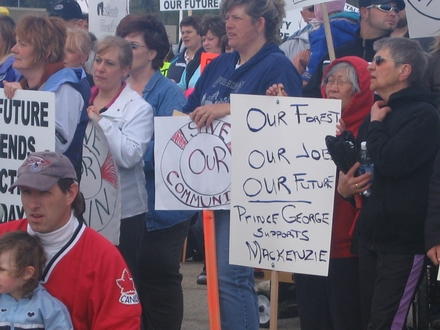Speakers Call For Community to Work Together
By 250 News
Friday, May 23, 2008 10:44 AM

Mackenzie, B.C. – Eight hundred people from Mackenzie Prince George, Fort St. James and even Alberta, marched into the parking lot of the Alexander Mackenzie Mall this morning, chanting, “Save our town, Save our town.”
Prince George North MLA Pat Bell was one of the first to take the stand to talk about what is being done to save Mackenzie. He said there are at least 5 bidders for the bankrupt Pope and Talbot pulp mill “It will take sometime to separate the wheat from the chaff, but we are certain there are three serious contenders, so I expect that will be resolved soon.” Bell also talked about a special contract that will set up workers to head to Fort McMurray for two weeks then fly them direct home to Mackenzie for two weeks, that is a contract he expects to see in place before the end of the summer. He also talked about the growing log home building business, which is thriving but needs people “We have the people so we are bringing some of those log companies here, and we are working with the College of New Caledonia to develop a log home building course that will be ready this fall.
Bell also talked about a new project with the Kettle Creek Stone company “The technology to take the face off the rock is the same as what is used in the sawmill so we are looking at that as well.” Bell also said there are efforts underway to step up the permitting process for the Mount Milligan Mine. “I know I can’t promise to bring that on line in the next 90 days, but there should be some activity within the next 7 months.”
Pat Bell received a round of applause when he assured al in attendance that raw logs will not be shipped out of the region “The logs are staying here!” he told the crowd.
It was New Democrat Forest Critic Bob Simpson who added some items to Pat Bell’s “to do list” . Simpson told the crowd Bell should commit to:
- Provincial money to match the funds that have come from the Federal government
- Tell Abitibi Bowater that if they are not operating a mill, they don’t have the forest license
- Tell Pope and Talbot the mill is a B.C. asset built off B.C. assets and the money will stay in B.C.
Bell asked all in attendance to work together “Today, more than ever, its important to work together, it is the only way we are going to get through this.”
Previous Story - Next Story
Return to Home








